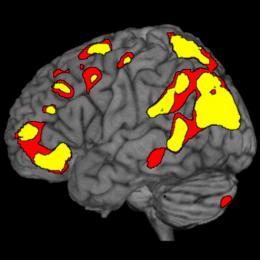Scientists find evidence for ‘chronesthesia,’ or mental time travel
December 23, 2010 | Source: PhysOrg.com
Researchers have found evidence for “chronesthesia,” which is the brain’s ability to be aware of the past and future, and to mentally travel in subjective time. They found that activity in different brain regions is related to chronesthetic states when a person thinks about the same content during the past, present, or future.
In their fMRI study, the researchers asked subjects to repeatedly think about taking a short walk in a familiar environment in either the imagined past, the real past, the present, or the imagined future. By keeping the content the same and changing only the mental time in which it occurs, the researchers could identify which areas of the brain are correlated with thinking about the same event at different times.
The results showed that certain regions in the left lateral parietal cortex, left frontal cortex, and cerebellum, as well as the thalamus, were activated differently when the subjects thought about the past and future compared with the present. Notably, brain activity was very similar for thinking about all of the non-present times.
Because mental time is a product of the human brain and differs from the external time that is measured by clocks and calendars, scientists also call this time “subjective time.” Chronesthesia, by definition, is a form of consciousness that allows people to think about this subjective time and to mentally travel in it.
